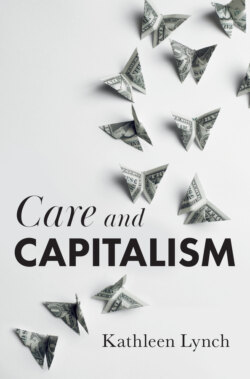Читать книгу Care and Capitalism - Kathleen Lynch - Страница 42
Denigration of care and domestic labour
ОглавлениеWhile the intellectual denigration of care work as natural to women, part of their essential nature, facilitated the exploitation of colonized women/carers, care was denigrated whether women did it or not as the dependency that called for care was seen as an aberration in the adult human condition, ‘a sign of incompleteness in an adult’, in neoliberal thinking (Moynihan 1973: 17). Being an adult and a citizen was closely aligned with the ideals of independence and autonomy in the post-industrial era; there were no ‘good’ dependencies for adults (Fraser and Gordon 1997: 135).
As being dependent is shameful in a society where productivity and ‘active citizenship’ reign as superior values, by extension, caring for non-citizens (adult dependents and children) is shaming by association, with significant political and economic consequences (Müller 2019). The abjection of dependency, carers and their caring work is not just a psychic matter however; it has had material and violent consequences, especially as reflected in the violence that women experience during pregnancy when they are likely to be more dependent (Tyler 2009: 87–94).
The abjection of care has been closely linked to the abjection of domestic work, where women also predominate. Although care work and domestic work are analytically distinguishable, in the embodied world of lived material reality they overlap (Duffy 2011). Because they do so, the lowly status of domestic work compounds the lowly status of caring. When care involves body work, it is often dirty work; it involves cleaning and managing the leaking fluids from the orifices of the body that are often uncontrolled and even uncontrollable.15 The leaky body smells, soils, and demands a huge amount of time and energy to keep it managed without harm, to keep it under control; the management of this human waste adds to the designation of hands-on caring as low-level life work (Hughes, McKie, Hopkins and Watson 2005: 266–8). The abject status of body work and domestic work is reflected in the fact that it is work very few people choose to do. Paid carers for frail older people in Europe are disproportionately migrant workers who often have no choice about doing this work (Da Roit, González Ferrer and Moreno-Fuentes 2013), as are domestic workers in many wealthy countries (IOM 2020).
While feelings of disgust and abjection at leaky, disintegrating bodies are not a modern phenomenon, the achievement-led, competitive individualism that characterizes contemporary culture is premised on the managed, contained, intact, cleansed and controlled body; bodily disintegration and leaking threaten this (Twigg 2000: 396). There is a ‘dematerializing tendency’ in how the vulnerable body is interpreted in contemporary Western culture; excretions, especially where they are involuntary and uncontrolled, and death and decay are distanced and sanitized in a way that hides the body. Status, especially professional status, is inversely related to the amount of body work involved, especially work with vulnerable, frail bodies (Twigg 2000: 391). Those who do hands-on body care work are made abject by their association with vulnerable bodies in a society that valorizes individualistic independence and productivity.
As Simone de Beauvoir observed in 1948, domestic work is governed by endless repetition (De Beauvoir 1993). In so far as domestic work is part of care work (Gutiérrez-Rodríguez 2014), it is repetitive work, a remark we heard frequently in our care conversations for Affective Equality (2009).16 It goes on incessantly in cycles of hours, days and years. And when one cycle ends another begins, be it in the meals that have to be produced, the cleaning that is required, or the cycles of age and illness that follow each other as life ebbs and flows.
Yet many tasks in life involve endless repetition: teaching the same school syllabus or fixing the same parts in cars year on year, meeting patients in surgery with the same illnesses time and time again or answering the same queries about computing on a software support line. What makes domestic work abject is not the repetition, but the conditions under which it is undertaken. Cleaning is not demeaning per se, but it becomes so when it is unrecognized, underpaid or unpaid. This is something women spoke of a great deal in our care conversations studies for Affective Equality,17 as did the minority of men who were primary carers.18
There is no doubt that the demanding, at times dirty, and thankless character of unpaid care labour and related domestic work helps explain its abjection. However, it is also made abject by the deep cultural assumption that this necessary work is not citizenship-defining labour; it is not the kind of work that those who are fully human (part of society rather than nature) have to do. This problem is greatly exacerbated in capitalist society given the deeply classed and gender-stratified division of care labour.
